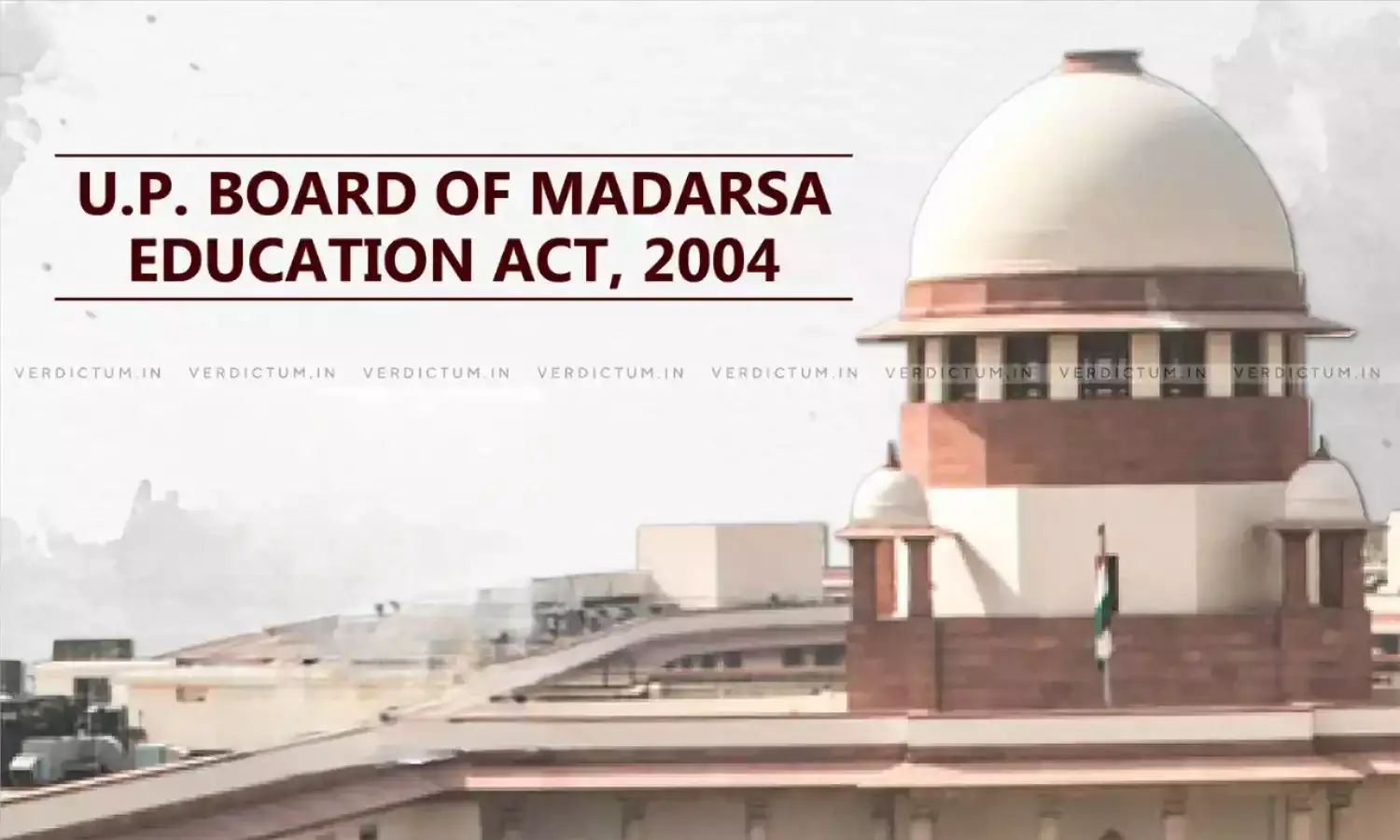UP Govt Defends 2004 Madarsa Act Before Apex Court, Argues That State Can Regulate Madarsa Even If It's Exempted From RTE Act
The Uttar Pradesh Government today supported the Uttar Pradesh Board of Madarsa Education Act, 2004 before the Supreme Court, which was struck down by the Allahabad High Court as unconstitutional for being violative of principles of secularism. The Apex Court today reserved its Judgment in the SLPs filed against the Judgment.
The UP Government supported the SLPs filed by aggrieved persons, even though it did not file any SLP challenging the Judgment.
Appearing for the State, ASG KM Nataraj told the Bench of Chief Justice DY Chandrachud, Justice JB Pardiwala and Justice Manoj Misra, "It is our legislation which has been struck down by the High Court, where we defended the statute and filed a counter. However, when the Constitutional Court struck down the legislation, we have not filed any SLP challenging that order".
He said that the State is defending the legislation and it does not want to go into anything beyond that, when asked by the CJI whether he is supporting the petitioners in the SLPs.
The CJI told the ASG that under Section 20 of the Act, wide power has been conferred on the State to "ensure that the basic quality of education is maintained in the Madarsas".
The ASG submitted that a legislation can be challenged only on the grounds of lack of competence, violation of fundamental rights and violation of any other provisions of the Constitution. He said that in the present case, the Act will have to be examined in the context of rights under Part 3 of the Constitution as there is no plea of lack of competence or violation of any other provisions of the Constitution. He said that while doing so, the entire Act cannot be struck down, but only any provision that offends fundamental rights.
He told the Court that the government has issued orders for making certificates issued by the Madarsa Bord for tenth and twelfth standards, equivalent to the tenth and twelfth certificates issued by the State Education Board. "However, when it comes to their Degree courses, no equivalence has been granted", he added.
The ASG also submitted that "As far as Degrees and PGs are concerned, there are two provisions in the Act, Section 9 and 20 of the Act, which specifically say they are Degrees and Diplomas, that may be little inconsistent with the provisions of the UGC Act."
It also came out during the hearings that the Degrees conferred by the Madarsa Board under the 2004 Act like Alim, Kamil, Fazil etc are notified by the UGC as Degrees, which can only be conferred by 'Universities' as per Section 22(1) of the UGC Act.
The ASG agreed with the Court that even conferring of Degrees in violation of the UGC Act will not lead to the striking down of the entire statute.
He submitted that even though Madarsas imparting religious education have been kept out of the purview of the RTE Act, the underlying principle under Article 21 which has been recognised as a fundamental right and the need to promote quality education applies to Madarsas also.
He submitted that the words "primarily imparting religious education" in Section 1(5) of the RTE Act apply to Madarsas also, meaning that only Madrasas which primarily impart religious education are exempted from the purview of the RTE Act. "If Madarsas impart secular education, they are not exempted (from RTE Act)", he submitted.
However, this was countered by Senior Advocate Menaka Guruswamy by saying that the Parliamentary discussions show that the words "primarily imparting religious education" apply only to educational institutions other than Madarsas and Vedic Pathsalas.
"Compulsory education which has now been brought in as a fundamental right was read as a part of the constitutional right that has to be given an actual meaning, it should be meaningful. The right conferred upon children to acquire proper knowledge about worldly affairs through modern education. It is desirable also to give modern education prescribed by academic experts", he submitted.
He submitted that 560 Madarsas in the State get grant-in-aid from the State.
The Supreme Court reserved its Judgment today.
The NCPCR had filed its written submissions in the matter stating that the 2004 Act instead of being an enabling tool, has become a depriving tool for the children studying in minority institutions.
On April 5, the Court had stayed the High Court's judgment.
Cause Title: Anjum Kadari and Anr. v. Union of India and Ors. [Diary No. 14432-2024]



